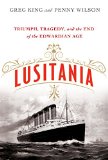Summary | Excerpt | Reviews | Beyond the Book | Readalikes | Genres & Themes | Author Bio

Critics' Opinion:
Readers' Opinion:
First Published:
Feb 2015, 400 pages
Paperback:
Apr 2016, 416 pages
 Book Reviewed by:
Book Reviewed by:
BookBrowse First Impression Reviewers
Buy This Book
Excerpt
Lusitania
Walking the deck with Edwin Friend, Theodate Pope noted that
Lusitania was going so slow that she thought the engines had stopped. Looking out across the water, "a marvelous blue and very dazzling in the sunlight," she said, "How could the officers ever see a periscope there?" Suddenly, the impact came; she likened the sound to "an arrow, entering the canvas and straw of a target, magnified a thousand times," rapidly followed by another "dull" explosion from somewhere below. "By Jove, they've got us!" Friend cried out, slamming his fist against his hand. They ran into a small corridor just outside the Smoking Room to escape the water and debris raining down on the deck; as they entered, Lusitania lurched to starboard, hurling them against the wall. Stepping back out into the sunlit afternoon, Theodate saw that "the deck suddenly looked very strange, crowded with people," including two women who "were crying in a pitifully weak way." As they made their way through "the crush of people coming and going," Theodate saw Marie Depage. Her eyes, she recalled, "were wide and startled, but brave." When Theodate finally found her maid, she could only say, "Oh, Robinson!"
In the First Class Dining Saloon, after a program that included "The Blue Danube," Lusitania's band had just ended a vigorous encore of "Tipperary" to entertain the diners. Cellist Handel Hawkins immediately stopped; although passengers rushed to- ward the exits, he saw "no panic." Most diners seemed stunned: the shock was so severe that glass in portholes—at least those that were closed—shattered and showered over the carpet. "It all happened so quickly," Josephine Burnside said, "that I can hardly remember it." "I had just finished making a collection for the musicians," Josephine Brandell recalled, "and sat down to finish my lunch." The explosion convulsed the ship, and everyone "rushed for the stairs. I heard someone shouting to be calm." But Josephine was "simply horrified with fright." Francis Jenkins, sharing her table, recalled how she clung to him as they made their way to the deck. "This," he said, "took perhaps some five minutes, as the boat listed very badly."
Robert Timmis, having enjoyed his cocktails with Ralph Moodie, was paying his bill when the torpedo hit. "It was not a severe blow," he remembered. "It was more a penetrating thrust, as though the torpedo must have gone through the ship." "They have got us!" Moodie cried out. As they fled the room, a steward shouted, "Steady, gentlemen, steady!" The list made ascending the Grand Staircase difficult, and Timmis helped a lady climb to the deck, one hand on the railing and the other holding her tight against his side. On reaching A Deck, Timmis struggled to his cabin: he found a lifebelt—there had been two, but another passenger had opened the door and taken the second.
Dorothy Conner and Howard Fisher had just finished their squab when they heard "a rather dull sound, like a soft blast, a slight shock," as he recalled. "What is that?" Dorothy cried out. "That," he told her, "is what we came after, a torpedo! We must go on deck!" To Fisher, it seemed as if "everyone" was "pouring forward" in an attempt to reach the deck. "Everything was confusion," and he didn't see any officers to direct passengers. Soon, Margaret Mackworth ran up, asking if she could remain with them until she found her father.
The second sitting in Lusitania's Second Class Dining Saloon was just beginning when the explosions came. Phoebe Amory, clad in her raincoat, saw a steward put a bowl of soup before her; this didn't appeal to her. Instead, "It occurred to me that I would like a salad." She was just about to ask the steward to switch out the two dishes "when there came the most terrible crash, which seemed to tear everything to pieces, and to rend the ship asunder."
Young Barbara Anderson remembered being with her mother, Emily, on the upper level of the Second Class Dining Saloon. "I got out of my chair," she recalled, "and stood next to my mother and looked down through the railing at all those people having lunch at the long tables." Curiously she had no memory of the explosions, merely that "great chaos" erupted in the room; un- aware of the danger, she still clutched her spoon engraved Lusitania . Apparently assistant purser William Harkness spotted Emily struggling to carry her daughter through the crowd; he hoisted the girl in his arms and led them up and out onto the deck near the stern.
Excerpted from Lusitania : Triumph Tragedy and the End of the Edwardian Age by Greg Kind and Penny Wilson. Copyright © 2015 by the authors and reprinted by permission of St. Martin's Press.





The Flower Sisters
by Michelle Collins Anderson
From the new Fannie Flagg of the Ozarks, a richly-woven story of family, forgiveness, and reinvention.

The House on Biscayne Bay
by Chanel Cleeton
As death stalks a gothic mansion in Miami, the lives of two women intertwine as the past and present collide.

The Funeral Cryer by Wenyan Lu
Debut novelist Wenyan Lu brings us this witty yet profound story about one woman's midlife reawakening in contemporary rural China.
Your guide toexceptional books
BookBrowse seeks out and recommends the best in contemporary fiction and nonfiction—books that not only engage and entertain but also deepen our understanding of ourselves and the world around us.